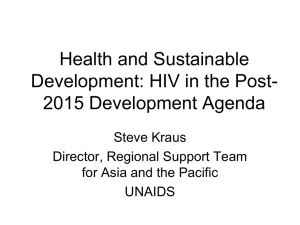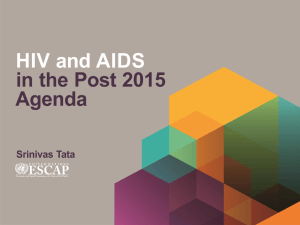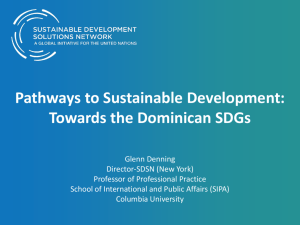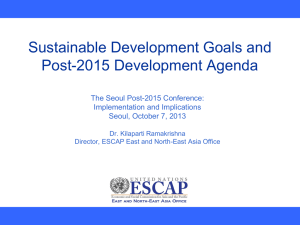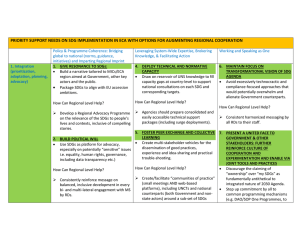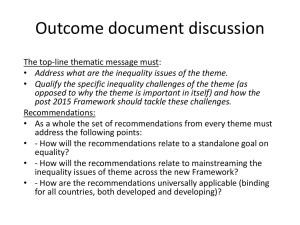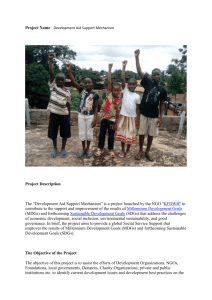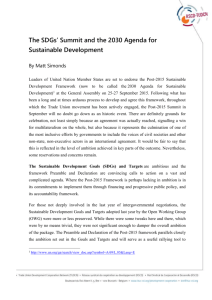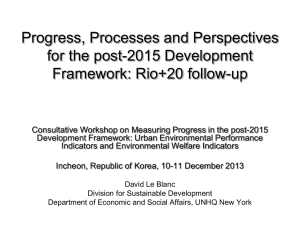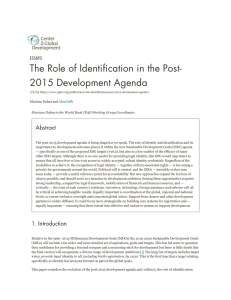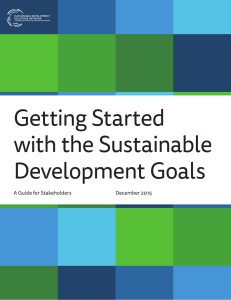Implementing the 2030 Agenda for Sustainable Development
advertisement
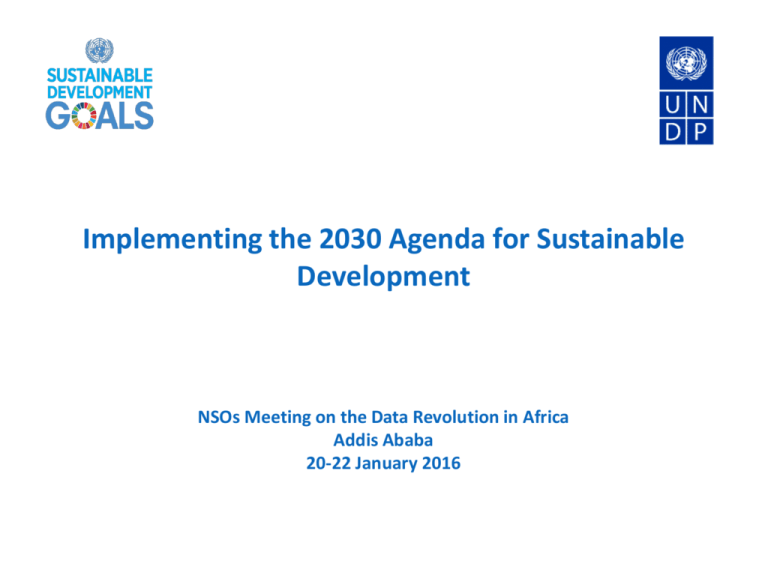
Implementing the 2030 Agenda for Sustainable Development NSOs Meeting on the Data Revolution in Africa Addis Ababa 20-22 January 2016 The New 2030 Agenda • Adopted 25 September 2015; January 2016 – December 2030 • “a plan of action for people, planet and prosperity”, “leave no one behind” • Consists of – Declaration – 17 Sustainable Development Goals (SDGs), 169 targets – means of implementation and renewed global partnership – framework for review and follow-up (possibly 229 indicators) Result of a Participatory Process Sustainable Development Goals From MDGs to SDGs • A much wider scope, beyond predominantly ‘social’ goals of MDGs, incorporating more fully aspects of economic and environmental sustainability, aspiration for peaceful and inclusive societies. • A more ambitious agenda, to eliminate rather than reduce poverty, with more demanding targets on health, education, gender equality • A universal agenda, applying to all countries and all people, with explicit recognition that international collective action is required Implementing the SDGs Now that this historic agenda has been adopted, how do we translate these goals into practical action? What is MAPS? MAINSTREAMING ACCELERATION POLICY SUPPORT Land the SDG agenda at national and local levels: integration into national and subnational plans for development; and into budget allocations Focus on priority areas defined by countries Support integrated approach, considering synergies & trade-offs Target resources at bottlenecks and gaps - financing, partnerships, measurement Support – skills and experience - from UN agencies to countries, which should be made available at a low cost in a timely manner MAPS Pay attention to cross-cutting issues: Partnerships Accountability Data MAPS components will not follow a sequential order, but can frame a coherent approach to policy guidance by the UN development system. The UNDAF remains the strategic framework for the UNCT. Deliverables 2015/2016: Mapping of agency / joint policy support tools Guidance for support to mainstreaming SDGs Guidance for national reporting on SDGs Toolkit for SDG-based acceleration framework Mainstreaming Reference Guide Array of approaches and tools that UNCTs can discuss with Member States to adapt the Agenda to national, sub-national and local conditions and realities. A menu of options, with case studies providing examples of how some countries have begun to develop and use relevant tools. It might also be of direct use to a broader audience of government officials and development practitioners. Early Implementation Efforts • Algeria is undertaking a study on the current capacities of the national statistics systems and their readiness to contribute to the SDGs. • Cabo Verde and Rwanda undertook a gap analysis to ascertain alignment of national development targets with SDGs. • Botswana is conducting dialogues to map potential shocks that might impact SDG achievement, to inform long-term vision & medium-term plan. • DRC is convening a multi-stakeholders discussions on the prioritization and integration of the SDGs in the upcoming national development plan. • Morocco is using the ongoing United Nations Development Assistance Framework process as an opportunity to raise awareness about the SDGs. • Somalia is localizing and prioritizing the SDGs in the special context of fragility, and is establishing a statistics database for key indicators. • To popularise the goals, Uganda has appointed SDG Ambassadors (President on Goal 16) and mapped SDGs onto text of national anthem. SDG Action Campaign UN Millennium Campaign: Build and maintain political will for achieving the MDGs Build multi-stakeholder partnerships Citizen & stakeholder outreach for post-2015 Global Conversation New UN SDG Action Campaign: Popularize SDGs in every country Engage stakeholders in implementation Sponsor citizen-driven processes to monitor progress MY WORLD RESULTS OVER 9.7 MILLION VOTES 194 COUNTRIES 1000+ PARTNERS 82% OFFLINE VOTES 77% VOTERS 30 YEARS OLD & YOUNGER OPEN SOURCE PLATFORM LIVE DATA VISUALIZATIONS COUNTRY LEVEL MULTI-STAKEHOLDER GROUPS data.myworld2050 .org A good education Equality between men and women Better healthcare Better transport and roads Better job opportunities Reliable energy at home An honest and responsive government Freedom from discrimination and persecution Affordable and nutritious food Political freedoms Protection against crime and violence Access to clean water and sanitation Protecting forests, rivers and oceans Support for people who can’t work Action taken on climate change Phone and internet access MY WORLD 2030 • Beta version available now at myworld2030.org • Respondents asked asked to select the SDGs they are most passionate about and rate progress • Customized survey development options • Tool for localization, monitoring and accountability • Participating in data revolution BUILD CUSTOM SURVEYS COLLECT DATA ANALYZE AND MANAGE DATA 1000+ PARTNER ECOSYSTEM TODAY MASS CITIZEN ENGAGEMENT PRIORITIZATIO N VEHICLE FOR SDGS SCALE AND REPRESENTATIVE NESS MY WORLD 2015 EMBEDDED INTO POLITICAL PROCESS GLOBAL , REGIONAL, NATIONAL, SUBNATIONAL LOCALIZATION, IMPLEMENTATION AND ACCOUNTABILITY MY WORLD 2030 NATIONAL STAKEHOLDER GROUPS FOR DESIGN AND ADVOCACY Implementing the SDGs SDG Implementation in Fragile and Conflict-Affected States Conflict-affected countries were famously ‘left behind’ by the MDGs • Fragile and conflict-affected states have been among the lowest performing countries with regards to the MDGs Conflict destroying development gains • Conflict and disaster often destroys hard gained development gains Special approach needed “Leave no one behind” • There was criticism that their special circumstances were not taken enough into consideration in the MDG process • For the SDGs, fragile and conflict-affected countries need targeted support to address bottlenecks SDG Readiness in Fragile States Study • UNDP Strategic Policy Unit is planning a research study to support the readiness of states affected by conflict and fragility to implement the 2030 Agenda, in short “The SDG Readiness in Fragile States Study” • The study will draw on a range of countries as case studies and publish recommendations for SDG implementation in fragile and conflictaffected states SDG Indicators • UN Statistical Commission Roadmap Inter-Agency and Experts Group on SDG Indicators established by UN Statistical Commission in March 2015 Two work streams: indicator framework, interlinkages across goals and targets Process is highly political and contentious. Strong oversight, or political guidance by member states. th SDG Indicators Framework to be presented at 47 Session of UN Statistical Commission expected in March 2016: 149 agreed indicators, 80 for further discussions • Mandate/Criteria Limited number of indicators, but no target left behind Data disaggregation by age, gender and other criteria to address vulnerability and exclusion Respect national policy space: each country can decide own indicators How did we support MDG Monitoring? Scorekeeper of the MDGs 500+ national MDG reports in 140+ countries Promotion of MDGs Assessment of progress Contribute to national debate on development Highlight challenges and insufficiently monitored issues • Country Report Guidelines in 2001, 2003, 2009, 2013 Support statistical capacity for measuring development progress Data collection and analysis to produce MDG reports Fill data gaps Improvement in data quality Help create data-friendly environment National SDG Reports • United Nations Development Group - Sustainable Development Working Group • Inter-agency task team on Data and National SDG Reports • Objectives: Strengthen data systems, capacities, methodologies and mechanisms to track progress Effective and efficient monitoring and reporting through coordination, facilitation, knowledge sharing Guidance for producing national SDG reports Pooled expertise from UN System to support for 144 low and middle income countries Data Ecosystem Mapping • Opportunities and constraints for stakeholders engagement in data revolution for sustainable development • 7 countries: Bangladesh, Colombia, Moldova, Mongolia, Senegal, Swaziland, Trinidad and Tobago Stakeholders Data producers Data users Data funders Infomediaries Capacities Statistical capacity Analytical capacity Data literacy Leadership Processes Monitoring, Accountability, Transparency Development planning Policy-making Knowledge sharing Policies Laws: FoI, A2I, Privacy, Security Enabling regulations E-commerce, Copyrights International obligations Infrastructure Telecoms, Data centers Data analytics, visualization Data standards Inter-operability Why Data Matters for the SDGs? Inform policies AAAA: High-quality data is essential for smart and transparent decisionmaking, can improve policymaking at all levels The complexity and inter-connectedness of the SDGs will require significant research and analysis to ensure the coherence of implementation efforts and manage trade-offs. Monitor progress With 169 targets, and potentially as many indicators, measuring the SDGs will require significant improvements in quality, reliability, availability and timeliness of development data Data from non-official, third-party sources can complement official statistics where gaps exist Leave no one behind Data can help achieve the transformative impact of the SDGs, by providing information on who benefits or not from the SDGs, through data disaggregation according to international human rights framework Accountability, participation and empowerment Data is necessary but not sufficient for accountability. People must have a say on which data about them is used and how. They must have access to data and be empowered to take action within their communities. Key Dates 2016 • 8-11 Mar: 47th Session of the Statistical Commission to agree on SDG indicators • 30 Mar-1 Apr: 3rd Meeting of the Inter-Agency and Experts Group on SDG Indicators • 11-12 Apr: UNGA High-Level Thematic Debate: Implementing Commitments on Sustainable Development, Climate Change and Financing • 22 Apr: Signing of Paris Climate Agreement • 11-20 Jul: High Level Political Forum on Sustainable Development • 18-22 Jul: ECOSOC High-level segment: The Theme “Implementing the post2015 development agenda: moving from commitments to results” Thank You!
